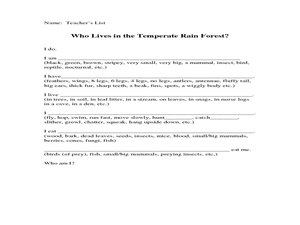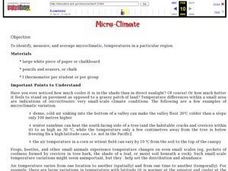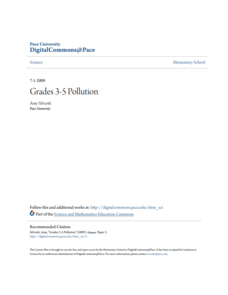Curated OER
Layers of the Forest
Learners explore rain forests. In this rain forest ecosystems lesson, students identify and describe the layers of the rain forest. Learners paint and decorate a large rain forest mural. Students write riddles about animals that...
Curated OER
Toxicology and Living Systems
Pupils investigate how toxic chemicals affect biological systems. They determine the toxic dose of a chemical that inhibits seed germination in a Brassica rapa. They investigate the effect of environmental tobacco smoke on human lung...
Curated OER
Throwing It All Away?
Students read a New York Times article as part of their investigation as to what happens when an item is thrown away or recycled. They analyze the relationship between a product's ingredients and its effect on the Earth and healthful...
Curated OER
Where is Away?
Focusing on where are garbage goes once we dispose of it, learners explore environmental concerns. Using a clear format, this lesson leads learners through a discussion of waste reduction, recycling, and composting. Then, they discuss...
WindWise Education
Are Birds Impacted by Small Wind Turbines?
How do we know if the wind turbine at our school is impacting birds? Here, small groups work together and conduct field work in order to determine the impact of a human-made structure on birds. The groups also determine their searcher...
Curated OER
Micro-Climate
Atmosphere aces investigate the microclimates that exist within a larger area. They use a thermometer to record the varying temperatures and identify the microclimates on a map that they have drawn. This exercise helps them to understand...
Curated OER
Prairie Senses
Second graders use their senses to explore a prairie or imaginary prairie. They draw pictures to represent the five senses and discover how an artist describes non-visual sensations in a visual way.
Curated OER
How We're Connected
Students take a survey in order to find out how they live in relationship to the environment. They take the time to investigate the differences between a need and a want. This is done as part of the self-assessment. Students also study...
Curated OER
Perched Parrot Decorative Chair
Students discuss the rainforests and why they are important to the Earth's environment. They study the habitats and characteristics of various animals that live in rainforests. Students build a decorative chair using a rainforest theme.
Curated OER
Rainbow Trout
Students investigate the many varieties of both tropical and freshwater fish, and find out about the anatomy of these creatures. They explore biodiversity in bodies of water, including information about coral reefs, and study the effects...
Curated OER
This House is Made of Mud: Exploring the Shapes in Our Lives
Students study about our dependence on the earth's resources for materials. They practice their knowledge of geometric shapes by recognizing them in the context of the story.
WolfQuest
The Return of Gray Wolves to Yellowstone National Park: Right or Wrong?
Should gray wolves be removed from Yellowstone National Park? After researching the complex relationships between the various habitats and species at Yellowstone National Park, including humans, class members take a position...
Howard Hughes Medical Institute
Human Skin Color: Evidence for Selection
Skin color is controlled by at least six genes. Young scientists learn about skin colors through a documentary. They discuss the topics of pigment, natural selection, and vitamin D absorption. They apply their knowledge to higher order...
Teach Engineering
Food Chains and Food Webs - Balance within Natural Systems
Feast on an informative resource. Scholars learn about food chains and food webs and how these interactions give information about the natural community. A PowerPoint presentation provides information about this concept.
Curated OER
Home Living / Daily Living: Dressing for the Weather
What to wear? Help your special needs class make independent choices about what they should wear during various weather conditions. They'll discuss weather-appropriate clothing, dress dolls for the weather outside, and even put on a...
Curated OER
Home Living / Daily Living: Labels on Food Products
Everybody needs to know how to make healthy choices when it comes to food. Understanding food labels is the first step. Using empty food packaging, you'll discuss what food labels are, what information can be found on them, and how to...
Rural Science Education Program
Bees and Flowers – Partners in Pollination
Why are bees so important? After several activities where kids investigate the form and function of flowers, they learn about the different types of bees and label them. They then examine pollen under a microscope and decide which bees...
Baylor College
A Place to Be
Home sweet home. Humans, birds, beavers, ants, we all need a place place to rest and keep us safe. In the ninth lesson of this series, the importance of shelter is discussed as the teacher reads aloud the book Tillena Lou's Day in the...
Pace University
Pollution
Over the course of 10 days, scholars take a pre-assessment to place them in one of three leveled groups. Whole-class and in small groups, pupils take part in read-alouds, field trips, hands-on activities, and complete learning contracts...
US Mint
Desert Dwellers
What can a quarter possibly teach young learners about desert ecosystems? More than you might think. After displaying and discussing the included picture of the Arizona state quarter, the class participates in a series of...
NOAA
It's a Roughy Life
Scientists recently discovered several previously unknown species at the Bear Seamount off the coast of New England. Scholars research these new species — benthopelagic, benthic, and seamount fish — and find out what makes them...
Howard Hughes Medical Institute
The Day the Mesozoic Died
While this is not the traditional, step-by-step lesson plan, it is chock-full of material that you can easily incorporate into your earth history unit. Its main purpose is to serve as a guide to using a three-part film, The Day the...
Curated OER
Water in Earth's Hydrosphere
Environmentalists test stream water for temperature, pH, and turbidity. Each group shares their information and then the class makes an overall evaluation of the water quality. A slide show sets the backdrop for the teaching portion and...
PBS
The Butterfly or Adult
Now that your class knows about the life cycle of a butterfly, it's time to discuss how an adult butterfly survives in the wild. The class diagrams and labels the parts of a butterfly, discusses how butterflies survive, and then make a...























